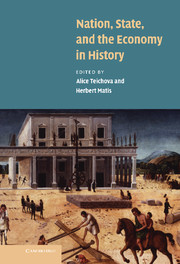Book contents
- Frontmatter
- Contents
- List of figures
- List of tables
- List of contributors
- Acknowledgements
- Introduction
- PART I
- 1 Political structures and grand strategies for the growth of the British economy, 1688–1815
- 2 Economic factors and the building of the French nation-state
- 3 Nation building in Germany: the economic dimension
- 4 The harmony liberal era, 1845–1880: the case of Norway and Sweden
- 5 Nationalism in the epoch of organised capitalism – Norway and Sweden choosing different paths
- 6 Economic development and the problems of national state formation: the case of Spain
- PART II
- PART III
- PART IV
- PART V
- Index
6 - Economic development and the problems of national state formation: the case of Spain
Published online by Cambridge University Press: 07 September 2009
- Frontmatter
- Contents
- List of figures
- List of tables
- List of contributors
- Acknowledgements
- Introduction
- PART I
- 1 Political structures and grand strategies for the growth of the British economy, 1688–1815
- 2 Economic factors and the building of the French nation-state
- 3 Nation building in Germany: the economic dimension
- 4 The harmony liberal era, 1845–1880: the case of Norway and Sweden
- 5 Nationalism in the epoch of organised capitalism – Norway and Sweden choosing different paths
- 6 Economic development and the problems of national state formation: the case of Spain
- PART II
- PART III
- PART IV
- PART V
- Index
Summary
Spanish schoolchildren have long been taught that Spain is one of the oldest nations in Europe, since its geographical unity dates from the late fifteenth century with the union of the kingdoms of Castile, Leon, Aragon, Granada and Navarre, carried out by marriage and conquest by that remarkable couple, Ferdinand and Isabella (commonly designated as the ‘Catholic Monarchs’ in Spain); real national identity, however, may have been longer to form, although this issubject to considerable discussion.
BIRTH OF A NATION?
It is well known that all these different kingdoms (to which Portugal was added from 1580 to 1640) were governed as separate entities for centuries and that Spanish writers of the sixteenth and seventeenth centuries advised that ‘the kingdoms must be ruled and governed as though their common king were only king of each one of them’.
So it was only slowly – and in incomplete fashion – that a Spanish identity came to be shaped through the centuries. In fact the Spanish case resembles in this respect more the British one than that of Portugal, Holland, or even France, to name other states which became political units in the early modern period. As in Britain, the Spanish state was a ‘united kingdom’; the old idea of some medieval Iberian monarchs had been the unification of the whole peninsula on the strength of a common Roman and Visigothic past, and of a similar experience of Christian defeat in the eighth century and then slow reconquest from the Muslims in the next centuries, culminating in the surrender of Moorish Granada in 1492.
- Type
- Chapter
- Information
- Nation, State and the Economy in History , pp. 113 - 130Publisher: Cambridge University PressPrint publication year: 2003
- 1
- Cited by



